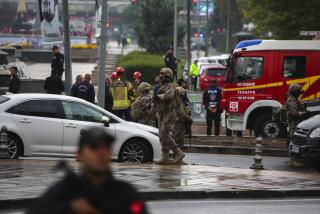U.S. Success Blurred by New Infighting, Turkish Moves
- Share via
WASHINGTON — President Clinton’s proclaimed success in prodding Baghdad to withdraw its forces from a Kurdish enclave was marred Thursday as two rival Kurdish factions opened fire on each other and Turkey announced plans to establish a buffer zone on its border with Iraq.
The action by the Kurdish groups--which went on for most of Thursday morning near the northern Iraqi city of Irbil while Iraqi forces were withdrawing from the area--was a setback for the Clinton administration, which has been trying to get the factions to make peace and resume a united stance against Baghdad.
At the same time, the administration was compelled to give its reluctant approval to the action by Turkey, which was designed to prevent one of the Kurdish factions from aiding Kurdish separatists in Turkey who have been a thorn in the side of the Ankara government.
Turkish officials also said they had launched “limited” airstrikes Thursday against suspected separatist bases in northern Iraq but provided no other details, wire services said.
Adding to the administration’s problems, U.S. officials conceded that, although the Iraqi army was withdrawing from the northern enclave, Iraq had left hundreds of security agents in the area, giving Baghdad greater political control than it had before it invaded Saturday.
The series of complications came as U.S. warplanes continued to patrol, without challenges from Iraqi missile batteries, the “no-fly” zone of southern Iraq that Clinton ordered expanded Wednesday.
Senior U.S. officials said, unless Iraq launched any further actions of its own, the United States most likely would not initiate any additional missile strikes. U.S. forces launched a total of 44 cruise missiles against Iraq on Tuesday and Wednesday, and a U.S. F-16 fighter fired a rocket at an Iraqi radar site Wednesday.
Meanwhile, the Clinton administration continued to parry suggestions that it had been unable to muster support from many allies in its latest foray against the forces of Iraqi President Saddam Hussein--a diplomatic issue that caused Washington some embarrassment.
Secretary of State Warren Christopher, in Europe to seek more support for the U.S. action, won grudging agreement from France to continue helping to enforce the “no-fly” zones. But the French said they would only patrol the southern “no-fly” zone up to the 32nd parallel, the limit before Clinton expanded the zone north to the 33rd parallel this week.
France has opposed the administration’s latest attacks, contending that the dispute between the Kurdish factions was an internal matter and that Iraq had a right to send troops into the Kurdish enclave.
The combination of developments left the administration in something of a diplomatic bind, despite its apparent success on the military front. Several analysts said privately that they believe Iraq had come out ahead in world opinion.
Robert W. Gaskin, a former Pentagon strategist, said the muddled international situation had left the United States with an image of weakness. Nevertheless, he said, Clinton could not have refused to take any military action.
Appearing before a Senate committee, John M. Deutch, director of the Central Intelligence Agency, said Iraqi forces were withdrawing from the Kurdish enclave “fairly systematically,” but he cautioned that Hussein “will continue to be a destabilizing force in the region.”
Wire services have reported that Iraqi security forces conducted a house-to-house search in Irbil for dissidents opposed to the Iraqi regime and took dozens of people into custody. There was no indication Thursday whether the arrests continued.
The fresh fighting between the two rival Kurdish factions in northern Iraq also was a setback for the administration, which until now has been using the need to protect the Kurds as a justification for barring Iraqi aircraft from flying over the Kurdish enclave.
Partly because of the hostility between the Kurdish groups, Clinton eschewed any suggestions that the United States take military action designed to prevent Iraqi troops from entering the Kurdish enclave.
The Kurdish battles, which went on all Thursday morning, were centered near the village of Bestana, southeast of Irbil. Although initial reports said that Iraqi troops took part in the battle, U.S. officials said the Iraqis merely stood by.
American officials said the United States, which earlier had tried to broker a peace settlement between the rival groups, would like to see them resolve their differences but was unlikely to launch any new diplomatic efforts until it could determine where their allegiances lay.
Officials of the Patriotic Union of Kurdistan, whose call for help from neighboring Iran this summer had angered the Iraqi regime, continued to defend that relationship on Thursday, saying that the group had been unable to win support from anyone else.
At the same time, leaders of the rival Democratic Party of Kurdistan, at whose invitation Iraqi forces entered the Kurdish enclave last weekend, insisted Thursday that their alliance with Iraq was “over now” and would not be continued.
Defense Secretary William J. Perry on Thursday said the United States was “not siding with either” of the Kurdish factions. “We are not getting involved in the civil war,” he said in an interview on CNN.
Meanwhile, in Baghdad, thousands of Arabs demonstrated against the recent series of U.S. missile attacks on Iraq and burned an effigy of Clinton. Iraq denounced the missile strikes on southern Iraq as a “war crime,” and asked the United Nations to condemn the action. The state-run newspaper Al Thawra called the U.S. action “a black cloud” of “spite and perfidy.”
Times staff writer William D. Montalbano and special correspondent Hugh Pope contributed to this report from Ankara.
More to Read
Sign up for Essential California
The most important California stories and recommendations in your inbox every morning.
You may occasionally receive promotional content from the Los Angeles Times.













